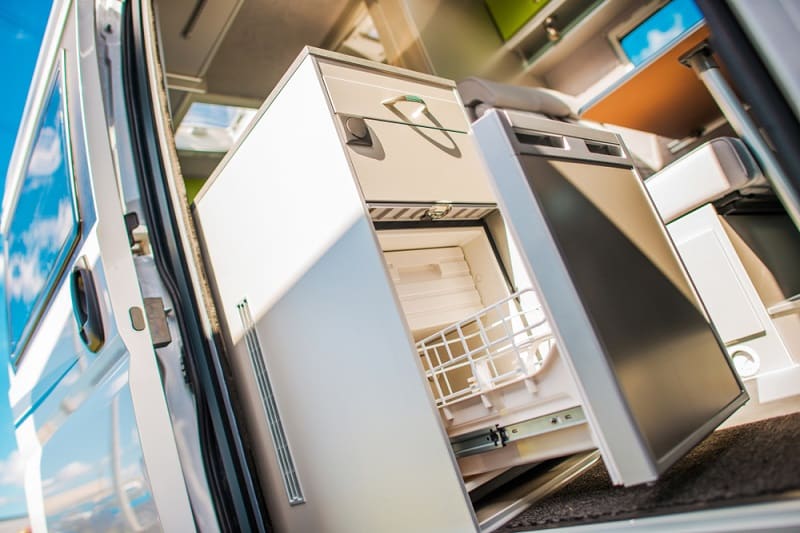
Propane vs. Electric RV Refrigerators
There are three types of RV refrigerators commonly available: two-way, which works on propane and 120v AC electricity, three-way which work on propane, 120v and 12v DC electricity, and finally, residential refrigerators, which only work on 120v AC electric.
Propane RV Refrigerators
Two-way refrigerators are the most common; these refrigerators run on both propane and 120v AC electric. Running the refrigerator on propane is useful when you are not plugged in at a campground with electrical hookups.
A three-way runs on both AC and DC electric, as well as propane. Three-way refrigerators are most often found in truck campers and vans. This type of RV refrigerator can run off your batteries, on propane or from the power source at a campground.
Likewise, this type of refrigerator is built with travel in mind and can take the bumps in the road.
Pros:
- Can run on both electricity and propane
- Great for camping off-grid
- More durable, and can handle the bumps and vibrations of the road
Cons:
- Usually has a smaller interior capacity
- Not as efficient at keeping your food cold
- Costs more if you are buying it new
All-Electric RV Refrigerators
The RV industry is moving towards residential refrigerators, at least in the larger and higher-end models; these are the same as the refrigerator in your home, and they will only work with 120v AC electric. This means you’ll have to stay at a campground or an RV park with an electric hookup, or, you will have to use your generator to keep your refrigerator working. Some RVers do manage to run a residential refrigerator on solar, but they have to install extra batteries and quite a bit of solar on the roof, to generate enough power for this type of refrigerator. Also, a residential refrigerator is designed to sit stationary and is not designed for travel.
Pros:
- More interior storage space
- Better at keeping food cold
- Less expensive to buy new
Cons:
- Not designed for travel
- Not flexible for camping off-grid. You’ll need a source of AC electricity
- More effort and expense to maintain
The type of refrigerator you choose for your RV will depend on the style of camping you wish to do; are you planning on staying in state and national parks, or will you be staying at campgrounds and RV parks with electrical hookups? While a residential refrigerator may be cheaper to buy, the number of solar panels and batteries you would need to install to allow you to camp off-grid would easily cancel out those savings. You could run it with a generator, but generators are noisy and consume fuel.
Related Video:

